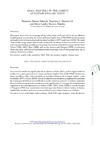Identificador persistente para citar o vincular este elemento:
https://accedacris.ulpgc.es/jspui/handle/10553/57911
| Campo DC | Valor | idioma |
|---|---|---|
| dc.contributor.author | Alonso Almeida, Francisco Jesús | en_US |
| dc.contributor.author | Álvarez Gil, Francisco José | en_US |
| dc.contributor.author | Marrero Morales, María Sandra | en_US |
| dc.date.accessioned | 2019-11-14T15:29:22Z | - |
| dc.date.available | 2019-11-14T15:29:22Z | - |
| dc.date.issued | 2019 | en_US |
| dc.identifier.issn | 0211-5913 | en_US |
| dc.identifier.other | Dialnet | - |
| dc.identifier.uri | https://accedacris.ulpgc.es/handle/10553/57911 | - |
| dc.description.abstract | This paper deals with the meanings of the verbal forms shall and will in the late Modern English period, as evinced in the Corpus of History English Texts (1700-1900). Earlier literature on modal verbs in historical periods includes Fachinetti (1997) and Gotti (2003). We study these modals using corpus tools in order to identify the senses of these two verbs in context and to group findings according to meaning. Our notion of modality mainly follows from Palmer (1986; 2001), Hoye (2008) and van der Auwera and Plungian (1998). Conclusions show that these verbal forms had indeed modal meanings, even if their periphrastic use to indicate future was evident | en_US |
| dc.language | eng | en_US |
| dc.relation.ispartof | Revista canaria de estudios ingleses | en_US |
| dc.source | Revista Canaria de Estudios Ingleses [ISSN 0211-5913], n. 79, p. 181-191 | en_US |
| dc.subject | 570201 Lingüística histórica | en_US |
| dc.subject.other | Modal verbs | en_US |
| dc.subject.other | Modality | en_US |
| dc.subject.other | Shall | en_US |
| dc.subject.other | Will | en_US |
| dc.subject.other | Late modern English | en_US |
| dc.subject.other | History texts | en_US |
| dc.title | Shall and Will in the Corpus of History English Texts | en_US |
| dc.type | info:eu-repo/semantics/article | en_US |
| dc.type | Article | en_US |
| dc.identifier.doi | 10.25145/j.recaesin.2019.79.11 | en_US |
| dc.identifier.url | http://dialnet.unirioja.es/servlet/articulo?codigo=7114377 | - |
| dc.description.lastpage | 191 | - |
| dc.identifier.issue | 79 | - |
| dc.description.firstpage | 181 | - |
| dc.investigacion | Artes y Humanidades | en_US |
| dc.type2 | Artículo | en_US |
| dc.contributor.authordialnetid | 166975 | - |
| dc.contributor.authordialnetid | 4278810 | - |
| dc.contributor.authordialnetid | No ID | - |
| dc.identifier.dialnet | 7114377ARTREV | - |
| dc.identifier.ulpgc | Sí | es |
| dc.description.dialnetimpact | 0,0 | |
| dc.description.dialnetq | Q2 | |
| dc.description.dialnetd | D5 | |
| dc.description.miaricds | 6,5 | |
| dc.description.erihplus | ERIH PLUS | |
| item.grantfulltext | open | - |
| item.fulltext | Con texto completo | - |
| crisitem.author.dept | GIR Discourse, Communication and Society | - |
| crisitem.author.dept | Departamento de Filología Moderna, Traducción e Interpretación | - |
| crisitem.author.dept | GIR Discourse, Communication and Society | - |
| crisitem.author.dept | Departamento de Filología Moderna, Traducción e Interpretación | - |
| crisitem.author.dept | GIR Lingüística aplicada a la docencia de la lengua extranjera, su literatura y traducción | - |
| crisitem.author.dept | Departamento de Filología Moderna, Traducción e Interpretación | - |
| crisitem.author.orcid | 0000-0003-4676-3831 | - |
| crisitem.author.orcid | 0000-0002-8752-9091 | - |
| crisitem.author.orcid | 0000-0002-9120-3772 | - |
| crisitem.author.parentorg | Departamento de Filología Moderna, Traducción e Interpretación | - |
| crisitem.author.parentorg | Departamento de Filología Moderna, Traducción e Interpretación | - |
| crisitem.author.parentorg | Departamento de Filología Moderna, Traducción e Interpretación | - |
| crisitem.author.fullName | Alonso Almeida, Francisco Jesús | - |
| crisitem.author.fullName | Álvarez Gil, Francisco José | - |
| crisitem.author.fullName | Marrero Morales, María Sandra | - |
| Colección: | Artículos | |
Visitas 10
153
actualizado el 11-ene-2026
Descargas
150
actualizado el 11-ene-2026
Google ScholarTM
Verifica
Altmetric
Comparte
Exporta metadatos
Los elementos en ULPGC accedaCRIS están protegidos por derechos de autor con todos los derechos reservados, a menos que se indique lo contrario.
